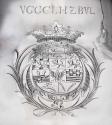Advanced Search
Livery pot
Wine pot
Livery pot
Marked by: Friedrich Kettwyck (active in 1643–1670)
German (Hamburg)
about 1650
Object Place: Germany
Medium/Technique
Silver, parcel-gilt
Dimensions
Overall: 69.2 x 44.5 x 21.6 x 27.9 cm (27 1/4 x 17 1/2 x 11 x 8 1/2 in.)
Credit Line
Anonymous gift
Accession Number2006.744
CollectionsEurope
ClassificationsSilver hollowware
Silver
Silver
Livery pots were among the largest and most lavishly decorated silver objects in royal households. Pots such as these, each weighing more than fifteen pounds when empty, were intended more for dazzling display than for practical use. They were made by one of the preeminent goldsmiths of mid-seventeenth century Hamburg and bear the arms of Christian Ludwig (1622-1665), Duke of Brunswick and Lüneburg and a great-uncle of George I of Great Britain and Hanover. Following the death of Christian Ludwig, these pots passed to his younger brother Duke Ernest Augustus II, father of George I.
Marks
Marked on neck, proper right side of spout, near rim, and again on foot rim: maker's mark for Friedrich Kettwych and Hamburg guild mark (in use 1642-1658).
InscriptionsEngraved on side with armorials and crown for Christian Ludwig, Duke of Brunswick and Luneberg (1622-1665). Engraved above the armorials: "VGGCLHZBVL [Von Gottes Gnaden Christian Ludwig Herzog zu Braunschweig und Luneberg]".
ProvenanceAbout 1650, Christian Ludwig (b. 1622 - d. 1665), Duke of Brunswick and Lüneburg (original commission) [see note 1]; by inheritance to his brother, Ernest Augustus (b. 1629 - d. 1698), Elector of Hanover; by inheritance to his son, George Louis (b. 1660 - d. 1727), Elector of Hanover, later George I, King of Great Britain (r. 1714 - 1727); by inheritance, through the Electors of Hanover, to George III (b. 1738 - d. 1820), King of Great Britain and Elector and King of Hanover [see note 2]; by inheritance to his son, George IV (b. 1762 - d. 1830), King of Great Britain and Hanover; by inheritance to his brother, William IV (b. 1765 - d. 1837), King of Great Britain and Hanover; 1837, by inheritance to his nephew, Ernst Augustus I (b. 1837- d. 1851), King of Hanover [see note 3]; by inheritance to his son, George V (b. 1819 - d. 1878), King of Hanover; by inheritance, through the Princes of Hanover, to Ernst Augustus V (b. 1954), Prince of Hanover. 2004, private foundation, United States; 2006, given from this private foundation to the MFA. (Accession Date: January 25, 2006)
NOTES:
[1] Engraved on the side with the armorials and crown for Christian Ludwig, and engraved above the armorials: "VGGCLHZBVL" (Von Gottes Gnaden Christian Ludwig Herzog zu Braunschweig und Luneberg).
[2] In 1816, the Elector of Hanover assumed the title of King.
[3] Because by Salic law a woman could not inherit the throne of Hanover, upon the succession of Queen Victoria of England in 1837, the crown passed to the oldest surviving son of George III.
NOTES:
[1] Engraved on the side with the armorials and crown for Christian Ludwig, and engraved above the armorials: "VGGCLHZBVL" (Von Gottes Gnaden Christian Ludwig Herzog zu Braunschweig und Luneberg).
[2] In 1816, the Elector of Hanover assumed the title of King.
[3] Because by Salic law a woman could not inherit the throne of Hanover, upon the succession of Queen Victoria of England in 1837, the crown passed to the oldest surviving son of George III.



